- Home
- Media Kit
- MediaJet
- Current Issue
- Past Issues
- Ad Specs-Submission
- Ad Print Settings
- Reprints (PDF)
- Photo Specifications (PDF)
- Contact Us
![]()
ONLINE
![]()
ONLINE

Project Liberty
Editors’ Note
Frank McCourt is a civic entrepreneur and the CEO of McCourt Global, a private family company committed to building a better future through its work across the real estate, sports, technology, media, and finance industries, as well as its significant philanthropic activities. He is a fifth-generation builder who is proud to extend his family’s 130-year legacy of merging community and social impact with financial results, an approach that started when the original McCourt Company was launched in Boston in 1893. McCourt is a passionate supporter of multiple academic, civic, and cultural institutions and initiatives.
He is the founder of Project Liberty, a visionary effort to transform the Internet through a new, equitable technology infrastructure and rebuild social media in a way that enables users to own and control their personal data. The project includes the development of a groundbreaking, open-source Internet protocol called the Decentralized Social Networking Protocol (DSNP), which will be owned by the public to serve as a new web infrastructure.
It also includes the creation of the McCourt Institute, launched with founding partners Sciences Po in Paris and Georgetown University in Washington, DC, to advance research, bring together technologists and social scientists, and develop a governance model for the Internet’s next era.
In 2020, McCourt launched and became CEO of Unfinished, an initiative that aims to strengthen civic life in the digital age by redirecting technology, especially social media, to fuel collaboration over division; renew and strengthening civic institutions to accelerate inclusive problem-solving; and grow a fairer economy. McCourt has served on Georgetown University’s Board of Directors for many years and, in 2013, made a $100 million founding investment to create Georgetown University’s McCourt School of Public Policy. He expanded on this project in 2021 with a $100 million investment to catalyze an inclusive pipeline of public policy leaders and put the school on a path to becoming tuition-free.
McCourt owns the French football club Olympique de Marseille and formerly owned the Los Angeles Dodgers. With family roots in the construction business dating back to the late 19th century, he has built upon this history with initiatives ranging from the development of Boston’s Seaport to large, mixed-use projects in Dallas, London, New York City, and elsewhere. McCourt graduated from Georgetown University, and is a proud father of six.
Company Brief
McCourt Global (mccourt.com) is a private family company focused on building for tomorrow through its work across real estate, sports, technology, media, finance, and social impact. Led by CEO Frank McCourt, a civic entrepreneur and fifth-generation builder, McCourt Global is committed to extending the McCourt family’s 130-year legacy of merging community and social impact with financial results – an approach that began when the original McCourt Company was launched in Boston in 1893.
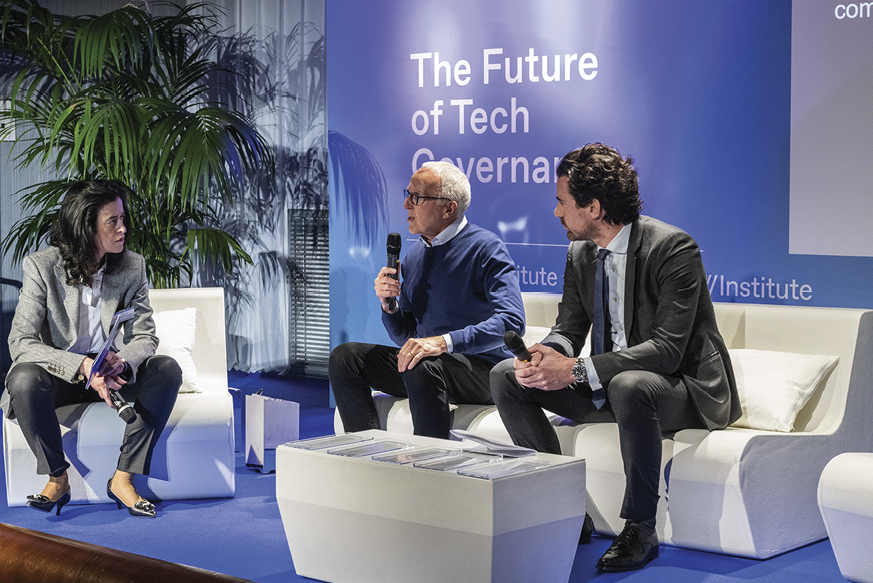
Frank McCourt in conversation with Mathias Vicherat,
President of Sciences Po, and Sheherazade Semsar de Boisseson,
Inaugural Executive Director of the McCourt Institute, during the
dedication of the Institute’s Paris location in March 2022
Did you always know you had an entrepreneurial spirit?
I would say that I was born with it. I think a lot about my great-grandfather who came over to this country as a 13-year-old from Ireland. As an adult, he worked for the Boston Gas Company, and when he was 50, he decided to start his own company – leaving a secure job to follow his vision and belief in himself and the possibilities that this country offered. When I look at the company today, five generations later, it has clearly changed a great deal. Today, we work all over the world in many different businesses. But at our core, we are entrepreneurs and builders, and not a day goes by that I do not think about my great-grandfather and all of my ancestors, and my parents in particular. The entrepreneurial spirit is part of my DNA and I believe that it is part of McCourt Global’s DNA as well.
Is it harder to maintain the family feel and culture of McCourt Global as the company has grown in size and scale?
I would not say it is harder, but you do need to be deliberate in focusing on maintaining the culture because as you grow, the culture no longer revolves around one person. It depends on everyone in the enterprise living the culture and being culture carriers. Many years ago, if you wanted to know what the culture of the organization was, someone would tell you to ask Frank. Now, if you want to know what the culture is, I would tell you to ask the last employee we hired. It is about everyone being aligned behind the values and principles of the enterprise.
It is a great question because it is something I thought long and hard about after selling the Los Angeles Dodgers when we began the next iteration of the enterprise. I had been involved in amazing projects with great companies and associated with great sports teams and organizations, but I had never really built a global enterprise that would thrive beyond any one individual – the kind of enterprise where, if I left for a year and came back, it would continue to become stronger and better. Building that kind of enterprise brings a new set of challenges, but at the same time we wanted to bring our family culture and family set of values to the organization even though parts of the business would be run by people outside of the family. We were very deliberate to make sure that the family’s values were a part of the company culture.
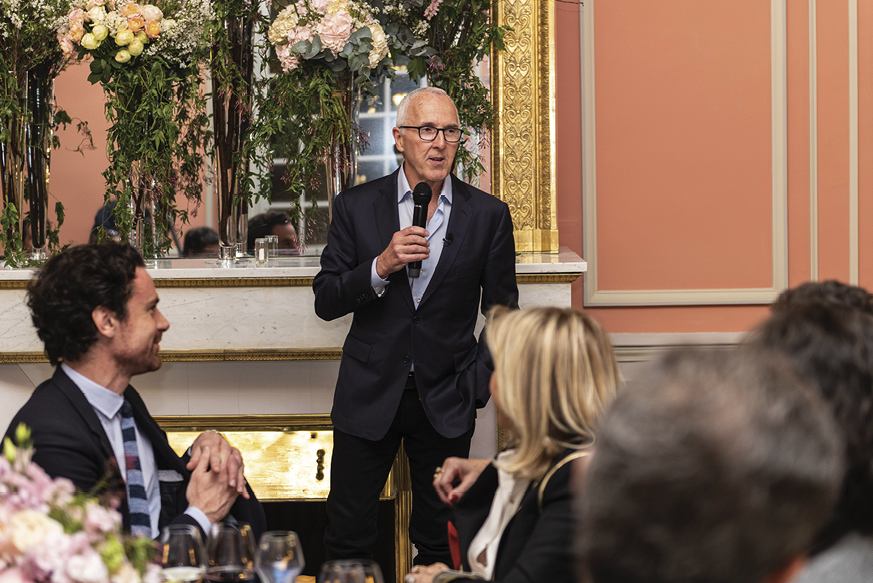
Frank McCourt welcoming guests at a private dinner
organized by the McCourt Institute in Paris in March 2022
Many entrepreneurs are not operators, and many operators are not entrepreneurs. Do you see yourself as both an entrepreneur and an operator?
I do, and I think you are hitting the nail on the head in that the secret sauce is to have the right balance. I had the benefit of growing up in our construction business which my three nephews run now, and I started at the bottom. I grew up in that operation from a laborer to a foreman to a superintendent and so on. I learned the business both in the field and in the office and, at the same time, was excited about envisioning projects and possibilities. I think I went through a period when I didn’t fully appreciate the balance between the two, and I had a lot of ideas that never saw the light of day. I realized that the truly great ideas are the ones that are worthy of the light of day and actually show up in the world and make the world better. I think that understanding the balance of what might seem like a good idea to an individual and what can actually be acted upon is critical. I was blessed with being able to see how things operate and rolling up my sleeves and doing the work, while also being blessed to have the entrepreneurial spirit to imagine what may be possible and could make an impact, just as my great-grandfather did. I think that the combination of the two has been integral in my ability to accelerate my work.
It is also about finding people who can do things that are not part of your expertise and who can bring different talents and skills to the enterprise. I have found that if you put forward possibility and inspiration and belief, it is amazing what can happen.
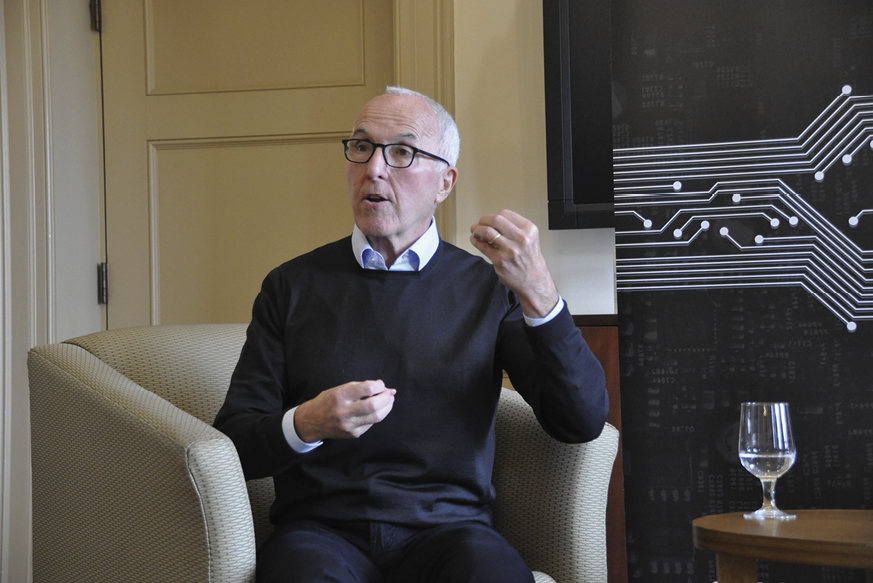
Frank McCourt speaking with McCourt School of Public Policy
students and faculty at Georgetown University in April 2022
Where did your commitment to social impact and giving back develop and what has made this such a core value for you and the company?
I know what makes us tick, but I believe that many family businesses feel the same way. We talk a lot about capitalism and its purpose – is it just profits or to make an impact – and much of that debate revolves around what I would call “Wall Street capitalism” which serves an important purpose in this country, but is very different from “Main Street capitalism.” Main Street capitalism is about businesses that are part of the community. I believe that most of these businesses share the need for dual purposes – the need to create value and be profitable in order to grow the business and employ people, while focusing on social impact and supporting the communities you serve. I do not feel this is a choice that has to be made, and the reality is that many businesses focus on both – they make money and create value, and also do good things for society and make a difference.
As I look at our own perspective, just as I mentioned my great-grandfather who was an entrepreneur and risk-taker and builder, I think back to my grandfather who was a part owner of the Boston Braves. In my family, the fact that he was a part owner of the Braves is a neat piece of history, but something we are much prouder of is that while he was an owner of the team, they started something called the Jimmy Fund. While the Braves left for Milwaukee in 1953 – and they are now, of course, in Atlanta – the Boston Red Sox have continued to support the Jimmy Fund since 1953. Today, the Jimmy Fund raises millions of dollars each year to support the fight against cancer.
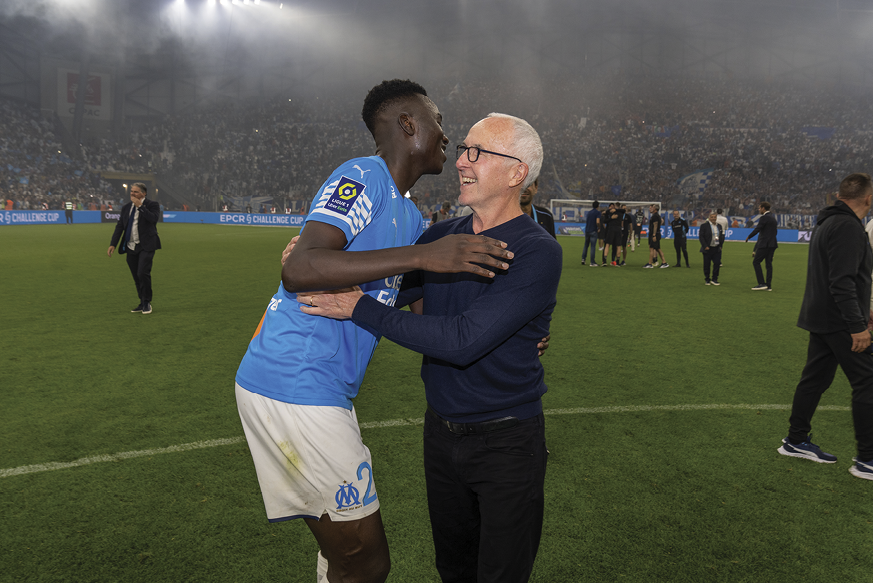
Frank McCourt celebrating a victory with
Olympique de Marseille midfielder Pape Gueye
What was your vision for creating Project Liberty and how do you define its mission?
It came out of a deep concern about the direction things were going in this country, a country that my family has helped build, quite literally, and a county that my family has benefitted from being a part of. I never thought that I would be concerned about the sustainability of democracy, but over the past decade or so, it has been of grave concern and growing. This prompted us to get into the conversation and really try to figure out what was going on, along with others, since we did not feel comfortable sitting idly by and watching the erosion of something that is dear to me and so many other people, and is key to all businesses in America being able to operate. We have an operating system that relies on democracy and capitalism which we need for all of us to thrive, and this stress and strain that we are observing right now is deeply concerning for me. I think that things are not working the way they should and the way they must in order to survive, and the reason I say that is both democracy and capitalism are based off a simple concept called trust, and when trust is destroyed, I do not believe that there is any chance that democracy, or even capitalism, can survive. If you remove the underpinning of these operating systems, then why would they survive? What we are seeing is a rapid erosion of trust – person-to-person trust, and certainly trust within institutions and society as a whole.
When we dug deeper into this, we concluded that technology is a big part of the problem and by technology, what I mean is two things: the way people’s data is treated and social media. Regarding the first point, I just don’t think an architecture that extracts people’s data, exploits it, and monetizes it, without giving any of the value to the people who are generating the data, and then uses the data without permission and is now even weaponizing the data, is an acceptable direction. This leads to a difficult, if not impossible, way to preserve democracy and capitalism because a surveillance type of capitalism is not right or morally correct. The idea of constantly being surveilled – whether you are walking down the street, in your home with smart devices, in your car with loaded software, shopping or searching on social media using the Internet – constantly having that data being extracted and used in these unhealthy ways I think is very unhealthy as well. This is the first area I am talking about when I refer to technology as being a big part of the problem.
The second, of course, is social media. If your mantra when you set out to build something is to “move fast and break things,” well then you are going to move fast and break things, and this objective has been achieved. The things that are being broken are really big things – democracy is a big thing, and we cannot let it break. We need to build technology and have social media platforms that are supporting our basic operating systems and are supporting democracy. It is no surprise to me that if you design technology without optimizing fairness, justice, democracy, etc., then you are not going to achieve those objectives. The technology is agnostic and, right now, we are optimizing for time spent online, and what causes people to spend lots of time online is anger and outrage – so we are optimizing for anger and outrage. That does not sound like optimizing for democracy to me or optimizing for a healthy society to me.
Project Liberty is a project that is part tech, but it is really much bigger than a tech project. It has three tracks: it has a movement making track, it has a governance track, and it has a tech track. The idea is that we came forward with a solution which is a protocol which we call Decentralized Social Networking Protocol (DSNP) which, if adopted, would transform the way the Internet works. This would allow you and me to have agency over our own data and we would decide who gets to see that data and for what purpose it is used.
We do not feel that a tech project without a movement is going to be able to change the trajectory of things. We need to get people interested and excited in changing the way things are working because they know things are not working correctly and they care about democracy and civil society and their kid’s mental health and so on. If people get interested, I think things will change, so coming forward with a solution and a movement for people to put their energy into is critical to get traction and impact. In addition, as we are currently moving from Web2 to Web3, there is a focus on not moving fast and breaking things, but rather moving fast and fixing things.
In summary, Project Liberty is a three-track project which is coming with a solution to how the Internet works and, if adopted, would fundamentally transform the Internet. This is an idea that is now in execution mode – it has been peer reviewed; we have built the “software” stack, and we know it works. We have already released the code and we see this as a gift that we are giving to the world and we hope that people consider it, use it, and prove it. I have said that if someone comes up with a better idea, we will support that idea – this is not about pushing a product, it is about changing the way the Internet works and really beginning the process of creating a new architecture for the digital world we live in. We need a new civic architecture for a digital world which will take time and effort and ingenuity and creativity, but we will get there because that is where America is at its greatest.
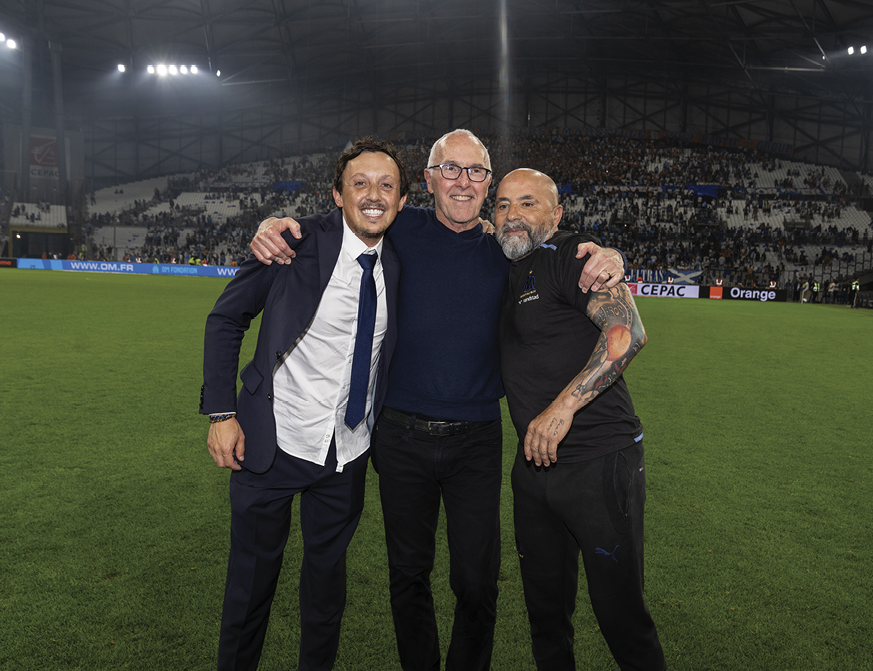
(left to right) Olympique de Marseille (OM) President
Pablo Longoria,
Frank McCourt, and OM head coach
Jorge Sampaoli after OM qualified for the
2022-23 Champions League
How do you measure success for Project Liberty?
This is a big idea. An analogy would be the idea of putting a man on the moon which was about space exploration – but the concept of putting a man on the moon was a big, bold idea that led to many other things which we have seen happen since Neil Armstrong stepped on the moon. It is important to remember that to put a man on the moon, we needed Project Mercury, we needed Project Gemini, we needed the Apollo Project, which were steps toward putting a man on the moon.
This is similar to transforming how the Internet works – think of it as putting a man on the moon. This idea is the first step toward changing the architecture for a digital world to support the concept of a thriving democracy and thriving economy. Democracy and the economy are like space exploration in this context – think of it as the big goal. If we can transform the way the Internet works, we are on our way to achieving that goal. It is going to take lots of things to get to a place where we feel that our democracy is thriving and our economy is thriving, and you need to take steps to get there.
Having said that, one interesting thing about the Internet is that it is very different from anything we have ever seen because of the speed at which things happen due to the connectivity and the network. That is the power of the Internet. I believe that if people decide that they want the Internet to work in a healthier, better manner, it can happen much quicker than you may think.
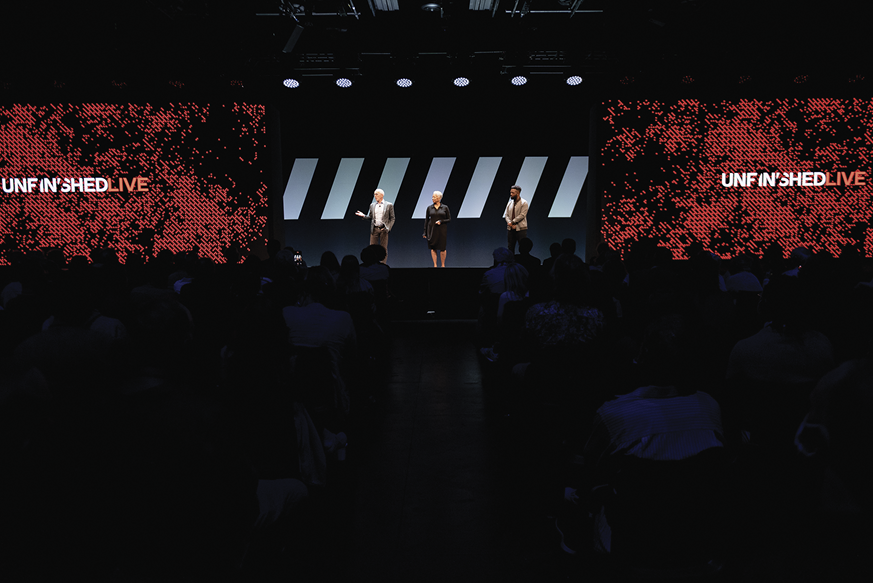
(left to right) Frank McCourt with Angela Glover Blackwell,
Chair of the Unfinished Network, and Baratunde Thurston, host
of Unfinished Live, welcoming attendees to 2021 Unfinished Live
event
at The Shed in New York City
How concerned are you about the future and are you optimistic that we can meet the challenge you are addressing?
I think that you can be deeply concerned about the future while still being highly optimistic – inherent in optimism is some kind of action. It is doing what it takes to try to make something better, and ideally this happens with many others who share that perspective and view because that is when great things happen. It starts with a small number and then it grows and then that optimism for action manifests itself into something quite real. I believe strongly in Project Liberty. I believe strongly that we can fix this problem.
What do you see as the keys to effective leadership and do you feel that leaders are born or can leadership be taught?
I think a few keys to leadership are empathy, listening, experience, character, optimism and courage. My opinion is that there are some leadership qualities that people are born with or born into or exposed to when they are very young, so they become part of your formation. I think part is growth and, like anything else, if one is practicing leadership, you will get better at it. This is where experience comes in – experience leads to better judgment which is a critical part of being an effective leader.
Do the skills that made you successful in business translate to being successful in philanthropy?
It is an interesting question because it is causing me to reflect on how I view philanthropy at different stages. For me, the most effective form of philanthropy is very similar to how I think about business. I am really interested in the process of creation – the process of building things that have impact. The common thread in my philanthropic work is that we are building something which takes a certain entrepreneurial spirit and are impact projects. I think the impact world can benefit from this type of philanthropy, just as I think that business can benefit from understanding the needs and challenges that the impact world is confronted with. I am excited about a new kind of philanthropy which is entrepreneurial and investing in a future that I care deeply about.
Are you able to enjoy the process and take moments to appreciate what you have accomplished?
I think I am getting a little better at reflection and taking moments to appreciate the progress and the accomplishments of our team. My personality type is about looking towards the next project or for the next opportunity, but it is important to celebrate the wins along the way with the people who are working with you to create and implement the next big idea.![]()